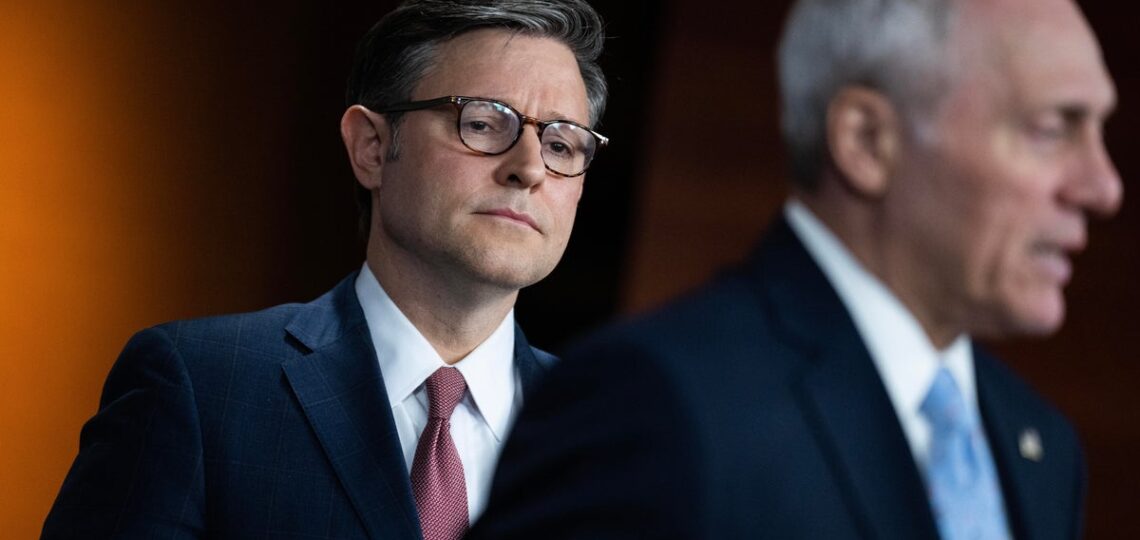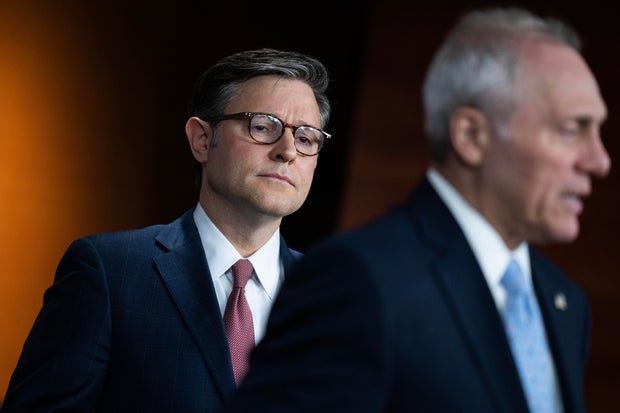
House to vote on White House rescission package to claw back $9.4 billion in funding for foreign aid, NPR, PBS
Washington — The House is expected to vote Thursday on the White House’s rescission package — its formal request to claw back funding for NPR, PBS and international aid that lawmakers had previously approved.
The package would cancel $9.4 billion appropriated by Congress, looking to make permanent some of the Department of Government Efficiency’s spending cuts. Its primary focus is slashing foreign aid — from peacekeeping efforts to refugee assistance and climate projects — but it would also essentially cut off federal funding for NPR and PBS.
House Speaker Mike Johnson, a Louisiana Republican, touted the request to cancel what he called “wasteful spending” in recent days, calling it a “manifestation of the DOGE effort,” adding that it would “ensure greater accountability in government going forward.”
The rescissions package includes $1.1 billion in cuts for the Corporation for Public Broadcasting, which provides funding to NPR and PBS. The White House has targeted the entities, claiming they have “spread radical, woke propaganda disguised as ‘news.'” PBS received $325 million in CPB funding this year.
Johnson said of NPR and PBS that funding them is an outmoded idea because “we’re in a different era now.”
“There is no reason for any media organization to be singled out to receive federal funds,” Johnson said. “Especially those who appear to have so little regard for the truth.”
The package would cut $8.3 billion for the United States Agency for International Development, or USAID, among other international assistance programs, after the foreign aid agency became an early target of the administration. Johnson said the resolution would make cuts in what he called the “USAID abuses area.”
Johnson said DOGE “went after USAID first for their review, their audits,” because USAID “opposed the loudest of this accountability measure,” claiming they “put the scrutiny targets on their own backs.”
Tom Williams/CQ-Roll Call, Inc via Getty Images
But some of the cuts have sparked objections among Republican lawmakers, like cuts to a program aimed at combatting HIV and AIDS globally. The President’s Emergency Plan for AIDS Relief, or PEPFAR, was started by former President George W. Bush, and has been credited for saving millions of lives around the world. Rep. Don Bacon, a Nebraska Republican, told The New York Times he would oppose the rescissions package because of these cuts, though he seemed to warm to the package this week, telling reporters he feels “better” about the cuts to the program after the House GOP conference met Tuesday. But he wouldn’t say how he planned to vote on the measure.
Other Republicans, like Sen. Susan Collins of Maine, have voiced concerns as well.
“PEPFAR cuts make no sense to me whatsoever, given the extraordinary record of PEPFAR in saving lives,” Collins told reporters last week, while pointing to several other global health care programs targeted in the rescissions package. “So, I have a lot of concerns.”
But Republican leaders in Congress were bullish about the path forward.
House Majority Leader Steve Scalise, a Louisiana Republican, said Tuesday that “our members are ready to go lock in some of those DOGE cuts,” adding that “this is a start — it’s a good start, it’s an important first step and we’re going to take it on Thursday.”
Johnson said the vote on the package “is an important signal — House Republicans are serious about getting our fiscal house in order, and we’ll do that.”
The rescissions process
Congress can cancel funds that the federal government has not yet spent but has previously appropriated under the rescissions process. Each year, Congress approves funding to keep the federal government running before the funds are disbursed to government agencies and programs. The president can temporarily defer funds or withhold them altogether — but only with Congress’ approval.
The White House’s official transmission of the rescission package on June 3 started the clock on a process that gives Congress 45 days to act. Rescissions requests first go before relevant committees for consideration, before moving to the full House and Senate for votes. In the Senate, rescission bills are not subject to the 60-vote threshold needed to advance most legislation in the upper chamber and only require a simple majority.
and
contributed to this report.
